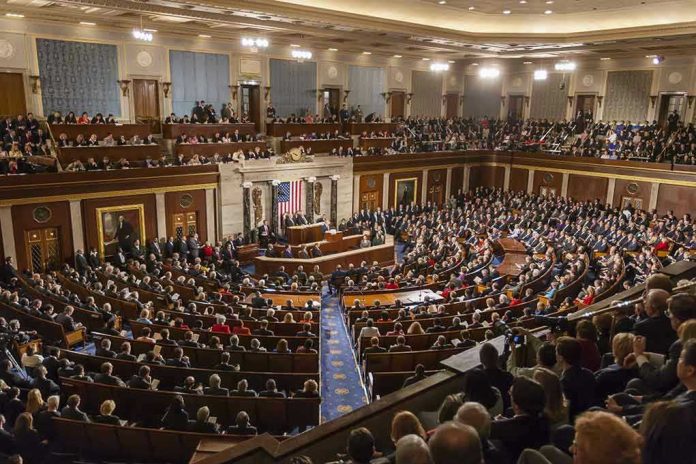
The moment a moderate Republican confronted Hakeem Jeffries in front of the press wasn’t just political theater—it crystallized the raw desperation and dysfunction gripping Congress as the government shutdown dragged into another agonizing week.
Story Snapshot
- A public, face-to-face argument between Rep. Mike Lawler (R-N.Y.) and House Minority Leader Hakeem Jeffries (D-N.Y.) exposed bipartisan frustrations over the ongoing shutdown.
- Lawler demanded immediate bipartisan action on a bill to temporarily extend Affordable Care Act (ACA) tax credits and reopen the government.
- The confrontation illustrated the deepening intra-party and cross-party divides, with moderates increasingly challenging leadership.
- Procedural standoffs and delayed swearing-in of new members intensified tensions, with no resolution in sight.
Shutdown Stalemate Breeds Public Confrontation
On October 8, 2025, the halls of Capitol Hill echoed with more than routine debate. Rep. Mike Lawler, a moderate Republican from New York, cornered House Minority Leader Hakeem Jeffries outside a press conference, challenging him to support a bipartisan bill that would temporarily extend enhanced ACA tax credits and reopen the government. The exchange quickly escalated, voices rising as reporters pressed in. Lawler accused Jeffries of political posturing and failing constituents, while Jeffries dismissed the confrontation as a “show,” refusing to engage on local endorsements or negotiating tactics. Both men represented the growing impatience among moderates tired of procedural brinkmanship and partisan gridlock.
The confrontation wasn’t an isolated incident. Earlier that morning, Democratic Senators had pressed Speaker Mike Johnson over procedural delays, while efforts to swear in Arizona’s Rep-elect Adelita Grijalva during a pro forma House session were rebuffed. These events punctuated the day’s tension, signaling a broader crisis in congressional governance. Moderates on both sides found themselves increasingly vocal, challenging leadership and demanding immediate action as federal workers faced missed paychecks and vital government services stalled.
Partisan and Intra-Party Divides Deepen
The shutdown’s origins lay in unresolved disputes over federal spending priorities and the scope of ACA tax credits. Speaker Mike Johnson continued to block bills addressing military pay and health care, deepening frustration among lawmakers. Rep. Jen Kiggans (R-Va.) publicly urged House leadership to protect military pay, while Rep. Tom Suozzi (D-N.Y.) joined Lawler in pushing for a temporary ACA extension. Jeffries, meanwhile, resisted temporary solutions, arguing for permanent enhancements to the ACA and accusing Republicans of engaging in “political stunts.” The delayed swearing-in of Grijalva became a flashpoint, further inflaming tempers and spotlighting the procedural dysfunction that characterized this shutdown.
🚨 BREAKING: A HEATED EXCHANGE between Hakeem Jeffries and Rep. Mike Lawler (R) during the shutdown – Hakeem is FURIOUS.
"Why don't you just keep your mouth SHUT."
Hakeem got up close and started pointing his finger at Lawler's chest: "You're NOT gonna talk to me and talk over… pic.twitter.com/CXAVMHe8a3
— Eric Daugherty (@EricLDaugh) October 8, 2025
Power dynamics shifted as moderate Republicans and Democrats challenged their respective leadership, refusing to quietly accept the status quo. Instead, they demanded pragmatic solutions and direct negotiations. Decision-making remained concentrated among party leaders, but vocal rank-and-file members like Lawler and Kiggans increasingly shaped the public narrative, casting themselves as champions of practical governance while painting leadership as out of touch.
Impact Reverberates Beyond Capitol Hill
Federal workers and contractors bore the brunt of the stalemate, facing missed paychecks and mounting uncertainty. Essential services languished, and local economies suffered as government operations slowed to a crawl. Healthcare recipients, insurers, and providers waited anxiously for word on ACA credits, while the defense sector grappled with delayed military pay and concerns over morale and readiness. The social toll grew heavier with each passing day, citizens’ trust in Congress eroding as lawmakers failed to deliver even stopgap solutions.
The political fallout was swift and severe. Moderates gained new prominence by publicly confronting leadership, raising the stakes and increasing the political cost of inaction. Analysts argued that such confrontations could catalyze compromise, forcing leaders to confront the reality of an impatient electorate and a restless legislative body. Others cautioned that these very public disputes risked entrenching divisions, making resolution more elusive and further delaying relief for those impacted by the shutdown.
Expert Perspectives on Dysfunction and Resolution
Political experts and congressional scholars pointed to the Lawler-Jeffries clash as a symptom of deeper legislative dysfunction. The frequency of public confrontations and procedural brinkmanship, they argue, has undermined the norms that once facilitated compromise. Healthcare policy experts warned that temporary solutions to ACA credits offer only fleeting stability, leaving beneficiaries and insurers in a perpetual state of uncertainty. The persistent inability to pass even minimal funding measures signaled a fundamental breakdown in congressional operations.
Some analysts suggested that the public airing of grievances could force leadership’s hand, making continued gridlock politically untenable. Others disagreed, arguing that such spectacles serve only to reinforce partisan narratives and harden positions. Within the broader context, the shutdown’s long-term implications include lasting damage to congressional credibility and the potential for major shifts in healthcare and defense policy should either side prevail in the standoff.
Sources:
Axios: Shutdown: Lawler confronts Jeffries as tensions peak
Fox News: Lawler and Jeffries heated shutdown argument



